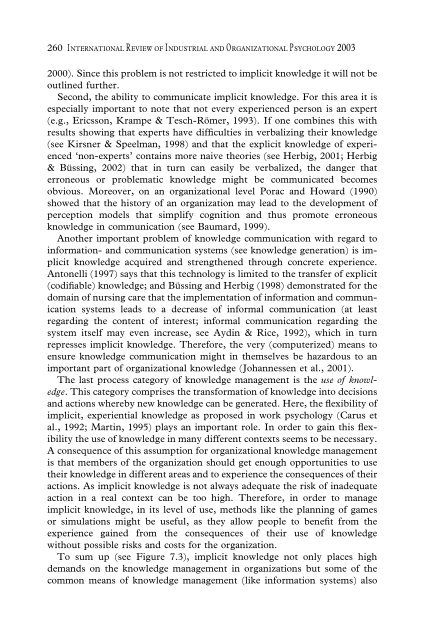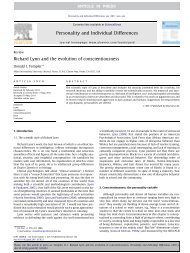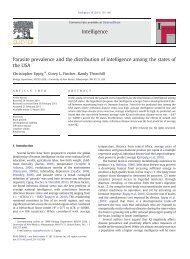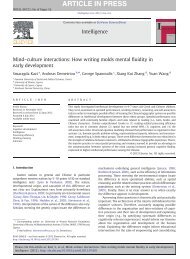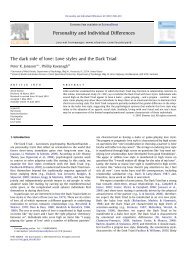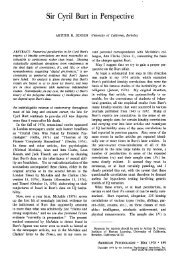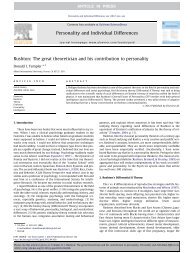International Review of Industrial and Organizational Psychology
International Review of Industrial and Organizational Psychology
International Review of Industrial and Organizational Psychology
You also want an ePaper? Increase the reach of your titles
YUMPU automatically turns print PDFs into web optimized ePapers that Google loves.
260 INTERNATIONAL REVIEW OF INDUSTRIAL AND ORGANIZATIONAL PSYCHOLOGY 20032000). Since this problem is not restricted to implicit knowledge it will not beoutlined further.Second, the ability to communicate implicit knowledge. For this area it isespecially important to note that not every experienced person is an expert(e.g., Ericsson, Krampe & Tesch-Ro¨mer, 1993). If one combines this withresults showing that experts have difficulties in verbalizing their knowledge(see Kirsner & Speelman, 1998) <strong>and</strong> that the explicit knowledge <strong>of</strong> experienced‘non-experts’ contains more naive theories (see Herbig, 2001; Herbig& Bu¨ssing, 2002) that in turn can easily be verbalized, the danger thaterroneous or problematic knowledge might be communicated becomesobvious. Moreover, on an organizational level Porac <strong>and</strong> Howard (1990)showed that the history <strong>of</strong> an organization may lead to the development <strong>of</strong>perception models that simplify cognition <strong>and</strong> thus promote erroneousknowledge in communication (see Baumard, 1999).Another important problem <strong>of</strong> knowledge communication with regard toinformation- <strong>and</strong> communication systems (see knowledge generation) is implicitknowledge acquired <strong>and</strong> strengthened through concrete experience.Antonelli (1997) says that this technology is limited to the transfer <strong>of</strong> explicit(codifiable) knowledge; <strong>and</strong> Bu¨ssing <strong>and</strong> Herbig (1998) demonstrated for thedomain <strong>of</strong> nursing care that the implementation <strong>of</strong> information <strong>and</strong> communicationsystems leads to a decrease <strong>of</strong> informal communication (at leastregarding the content <strong>of</strong> interest; informal communication regarding thesystem itself may even increase, see Aydin & Rice, 1992), which in turnrepresses implicit knowledge. Therefore, the very (computerized) means toensure knowledge communication might in themselves be hazardous to animportant part <strong>of</strong> organizational knowledge (Johannessen et al., 2001).The last process category <strong>of</strong> knowledge management is the use <strong>of</strong> knowledge.This category comprises the transformation <strong>of</strong> knowledge into decisions<strong>and</strong> actions whereby new knowledge can be generated. Here, the flexibility <strong>of</strong>implicit, experiential knowledge as proposed in work psychology (Carus etal., 1992; Martin, 1995) plays an important role. In order to gain this flexibilitythe use <strong>of</strong> knowledge in many different contexts seems to be necessary.A consequence <strong>of</strong> this assumption for organizational knowledge managementis that members <strong>of</strong> the organization should get enough opportunities to usetheir knowledge in different areas <strong>and</strong> to experience the consequences <strong>of</strong> theiractions. As implicit knowledge is not always adequate the risk <strong>of</strong> inadequateaction in a real context can be too high. Therefore, in order to manageimplicit knowledge, in its level <strong>of</strong> use, methods like the planning <strong>of</strong> gamesor simulations might be useful, as they allow people to benefit from theexperience gained from the consequences <strong>of</strong> their use <strong>of</strong> knowledgewithout possible risks <strong>and</strong> costs for the organization.To sum up (see Figure 7.3), implicit knowledge not only places highdem<strong>and</strong>s on the knowledge management in organizations but some <strong>of</strong> thecommon means <strong>of</strong> knowledge management (like information systems) also


